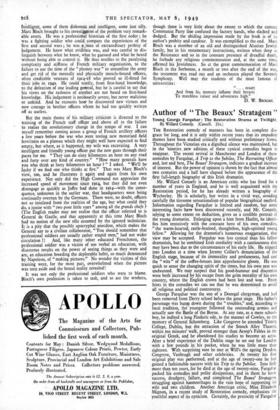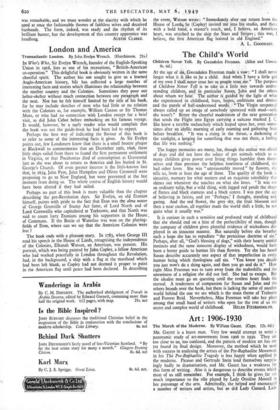Author of " The Beaux' Stratagem
THE Restoration 'comedy of manners has been in complete dis- grace for long, and it is only within recent years that-its impudent themes have been studied critically and without preliminary frown. Throughout the Victorian era a dignified silence was maintained, but in the 'nineties new editions of these cynical comedies began to reappear. The recent revival in Manchester and London of three comedies by Farquhar, A Trip to the Yubilee, The Recruiting Officer and, last and best, The Beaux' Stratagem, indicates a gradual increase of interest. But the power of opinion is shown by the fact that almost two centuries and a half have elapsed before the appearance of the first full-length biography of this Irish dramatist.
Mr. Willard Connely is an American' critic who has lived for a number of years in England, and he is well acquainted with the Restoration period, for he has already written a biography of Wycherley. He is scholarly, but writes in a vivid way, avoiding carefully the tiresome sensationalism of popular biographical method. Inforination regarding Farquhar is limited and random, but some interesting facts -have been discovered recently, and Mr. Connely, relying to some extent on deduction, gives us a credible portrait of the young dramatist. Enlarging upon 'a hint from Hazlitt, he identi- fies him tentatively with the constant hero of his own comedies, " the warm-hearted, rattle-brained, thoughtless, high-spirited young fellow." Allowing for the dramatist's humorous exaggeration, that view may be accepted. Farquhar was less cynical than his fellow dramatists, but he combined Irish cordiality with a cautiousness that may have been due to the circumstances of his early life. He tripped into London at a time when Jeremy Collier's denunciation of the English stage, because of its immorality and profaneness, had cast the " wits " of the coffee-houses into apprehensive gloom. He • was quick to sense the changing spirit of the times, but his own zest was undaunted. We may suspect that his good-humour and discretion were both increased by his escape from the grim morality of his own country, where the English crown had been lost and won. • From hints in the comedies we can see that he was determined to avoid
all religious and political controversy. •
George Farquhar was the son' of a Donegal clergyman, and had been removed from Derry school before the great siege. His -father's parsonage was burfit down during the " troubles," and, according to local tradition, the youngster followed the contending armies and actually saw the Battle of the Boyne. At any rate, as a mere school- boy, he indited a long Pindaric ode, in the manner of Cowley, to the memory of General Schomberg. Like Congreve he attended Trinity College, Dublin, but the attraction of the Smock Alley Theatre, within ten minutes' walk, proved stronger than Aesop's Fables in the original Greek, and he abandoned his studies to become an actor. After a brief experience of the Dublin stage he set out for London with a few pounds in his pocket, when he was little more than eighteen. With surprising ease he met at Will's the ageing Dryden, Congreve, Vanbrugh and other celebrities. At twenty his first original play was performed, and at the age of twenty-one he had gained a fashionable success with his Trip to the jubilee. Into little more than ten years, for he died at the age of twenty-nine, Farquhar packed his comedies and polite dissipations, and in them he knew success, drudgery, failure, and completed The Beaux' Stratagem, struggling against haemorrlages in the vain hope of supporting his wife and two children. Another American critic, Miss. Elizabeth Mignon, in a recent study of Restoration comedy, emphasises" the youthful aspect of its cynicism. Certainly, the precocity of Farquhar
was remarkable, and we must wonder at the alacrity with which he aped at once the fashionable "themes of faithless wives and deceived husbands. The form, indeed, was ready and the rhythm of its brilliant banter, but the development of this country apprentice was







































 Previous page
Previous page